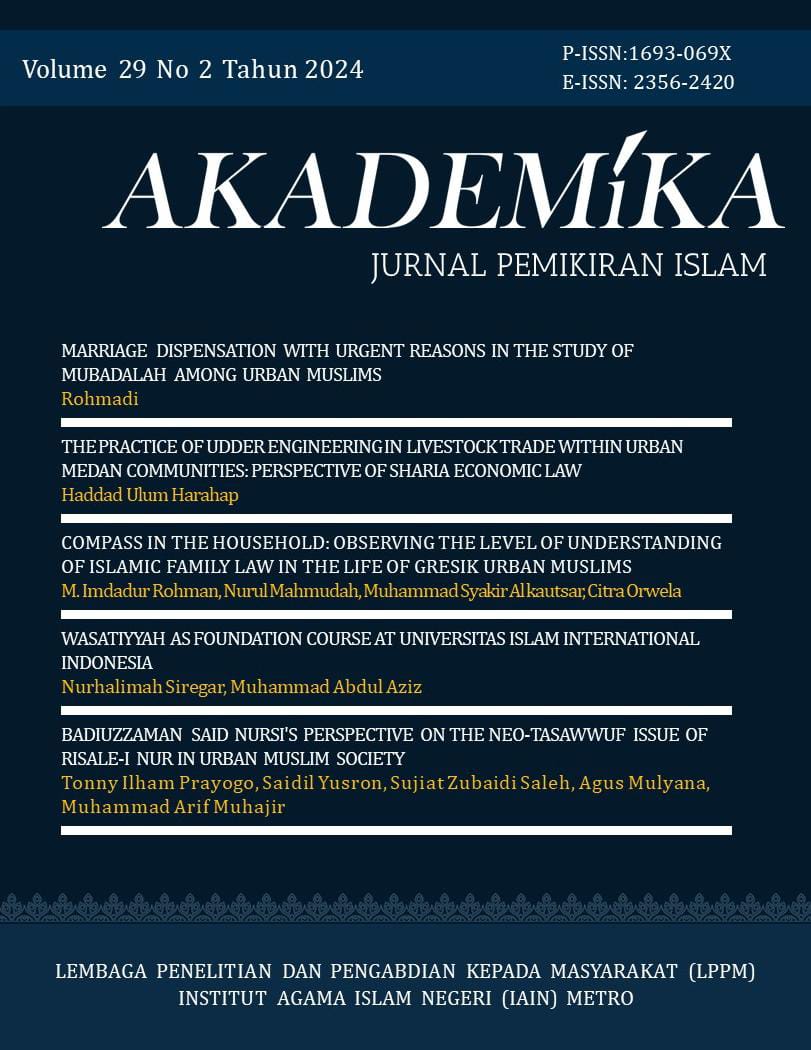WASATIYYAH AS FOUNDATION COURSE AT UNIVERSITAS ISLAM INTERNATIONAL INDONESIA
DOI:
https://doi.org/10.32332/akademika.v29i2.9108Keywords:
Harmony; Islamic education; Moderation; Tolerance; Wasatiyyah IslamAbstract
The Islamic concept of wasatiyyah is reflected in the Qur’an, which refers to the Muslim community as a moderate people (ummatan wasatan). It means that a Muslim should be in the middle path in many aspects of life, which promotes benefits and avoids extremism. In doing so, education plays a significant role in promoting the concept of wasatiyyah. However, the concept itself has been neglected in the teaching and learning of Islamic higher education, which is an inseparable part of urban Muslim communities. This study is aimed to explore the implementation of the wasatiyyah course at Universitas Islam International Indonesia. The study was conducted qualitatively with a case study research design to investigate students’ perspectives on the wasatiyyah course. A total of four participants with different backgrounds of study, cultures, and religions participated in this study. The data was collected through semi-structured interviews and analyzed with the Miles and Huberman framework. Overall, the result of the study shows that the students perceive positively towards the course of wasatiyyah Islam. In addition, the study also demonstrates students’ reflection on the practice of the concept of wasatiyyah in a plural context. Hence, it recommends reimagining the concept of wasatiyyah in Islamic universities by implementing the idea into the course subjects to promote tolerance and harmony within diversity.
Downloads
References
Abubakar, I., & Hemay, I. (2020). Pesantren Resilience: The Path to Prevent Radicalism and Violent Extremism. Studia Islamika, 27(2), Article 2. https://doi.org/10.36712/sdi.v27i2.16766.
Afrianty, D. (2012). Islamic Education and Youth Extremism in Indonesia. Journal of Policing, Intelligence and Counter Terrorism, 7(2), 134–146. https://doi.org/10.1080/18335330.2012.719095.
Afwadzi, B., & Miski, M. (2021). Literature Review Religious Moderation in Indonesian Higher Educations: Literature Review. Ulul Albab Jurnal Studi Islam, 22(2), Article 2. https://doi.org/10.18860/ua.v22i2.13446.
al-Qaraḍāwī, Y. (2009). Fiqh al-Wasaṭiyyah al-Islāmiyyah wa al-Tajdīd: Ma‘ālim wa Manārāt. Dār al-Shurūq.
A’la, A. (2008). The Genealogy of Muslim Radicalism in Indonesia: A Study of the Roots and Characteristics of the Padri Movement. Journal of Indonesia Islam, 2(2), Article 2. https://doi.org/10.15642/JIIS.2008.2.2.267-299.
Aziz, M. A. (2024). The Art of Moderation in Islamic Semantic Legal Theory: The Case of Yūsuf al-Qaraḍāwī’s Fiqh al-Aqalliyyāt. International Journal Ihya’’Ulum al-Din, 26(1), Article 1. https://doi.org/10.21580/ihya.26.1.20396.
Baedowi, M., Musmuallim, & Chamadi, M. R. (2023). Sikap Moderasi Beragama mahasiswa di Universitas Jenderal Soedirman Purwokerto. Injire, 1(2), Article 2.
Basit, A. (2016). The ideological fragmentation of Indonesian Muslim students and da’wa movements in the postreformed era. Indonesian Journal of Islam and Muslim Societies, 6(2), Article 2. https://doi.org/10.18326/ijims.v6i2.185-208.
Calis, H. (2022). The Theoretical Foundations of Contextual Interpretation of the Qur’an in Islamic Theological Schools and Philosophical Sufism. Religions, 13(2), Article 2. https://doi.org/10.3390/rel13020188.
Fadlan, M. N., & Saputra, R. E. (2017). Islam, Radicalism, Democracy, and Global Trends in Southeast Asia. Studia Islamika, 24(3), Article 3. https://doi.org/10.15408/sdi.v24i3.6566.
Gunawan, H. (with Gunawan, H.). (2023). Pendidikan Moderasi Beragama: Vol. I (1; Nomor 1). CV. Alfabeta. https://digilib.uinsgd.ac.id/69088/.
Hanafi, et al, M. M. (2022). Tafsir Tematik Moderasi Beragama. Lajnah Pentashihan Mushaf Al-Qur’an.
Jati, W. R. (2013). Radicalism in the Perspective of Islamic-Populism: Trajectory of Political Islam in Indonesia. Journal of Indonesian Islam, 7(2), Article 2. https://doi.org/10.15642/JIIS.2013.7.2.268-287.
Kamali, M. H. (2015). The Middle Path of Moderation in Islam: The Qur’ānic Principle of Wasaṭiyyah. Oxford University Press, USA.
Muzakki, A. (2014). The Roots, Strategies, and Popular Perception of Islamic Radicalism in Indonesia. Journal of Indonesian Islam, 8(1), Article 1. https://doi.org/10.15642/JIIS.2014.8.1.1-22.
Nasir, M., & Rijal, M. K. (2021). Keeping the middle path: Mainstreaming religious moderation through Islamic higher education institutions in Indonesia. Indonesian Journal of Islam and Muslim Societies, 11(2), Article 2. https://doi.org/10.18326/ijims.v11i2.213-241.
Onwuegbuzie, A. J., & Weinbaum, R. K. (2016). Mapping Miles and Huberman’s Within-Case and Cross-Case Analysis Methods onto the Literature Review Process. Journal of Educational Issues, 2(1), 265. https://doi.org/10.5296/jei.v2i1.9217.
Rahmadi, R., & Hamdan, H. (2023). Religious Moderation in the Context of Islamic Education: A Multidisciplinary Perspective and Its Application in Islamic Educational Institutions in Indonesia. Khazanah: Jurnal Studi Islam Dan Humaniora, 21(1), 59–82. https://doi.org/10.18592/khazanah.v21i1.8487.
Ridwan, I., & Abdurrahim, A. (2023). Persepsi dan Pengamalan Moderasi Beragamat dalam Mengembangkan Sikap Sosio-Religius dan Toleransi Beragama di Perguruan Tinggi Umum. Jurnal Pendidikan Karakter Jawara (Jujur, Adil, Wibawa, Amanah, Religius, Akuntabel), 9(1). https://jurnal.untirta.ac.id/index.php/JAWARA/article/view/19959.
Sirry, M. (2020). Muslim Student Radicalism and Self-Deradicalization in Indonesia. Islam and Christian–Muslim Relations, 31(2), 241–260. https://doi.org/10.1080/09596410.2020.1770665.
Sirry, M. (2024). Youth, Education, and Islamic Radicalism: Religious Intolerance in Contemporary Indonesia. University of Notre Dame Press.
Soage, A. B. (2010). Sheikh Yūsuf al-Qaradawi: A Moderate Voice from the Muslim World? Religion Compass, 4(9), 563–575. https://doi.org/10.1111/j.1749-8171.2010.00236.x.
Strauss, A., & Corbin, J. M. (1998). Basics of Qualitative Research: Techniques and Procedures for Developing Grounded Theory. SAGE Publications.
Thomas, G. (2011). A Typology for the Case Study in Social Science Following a Review of Definition, Discourse, and Structure. Qualitative Inquiry. https://doi.org/10.1177/1077800411409884.
Tim Kelompok Kerja Moderasi Beragama Kementerian Agama RI. (2020). Peta Jalan (Roadmap) Penguatan Moderasi Beragama Tahun 2020—2024. Kemenag RI.
Tim Penyusun Kementerian Agama Republik Indonesia. (2019a). Moderasi Beragama. Badan Litbang dan Diklat Kementerian Agama RI.
Tim Penyusun Kementerian Agama Republik Indonesia. (2019b). Tanya Jawab Moderasi Beragama. Badan Litbang dan Diklat Kementerian Agama RI.
Widigdo, M. S. A. (2017). Nīshāpūrī Scholars in The Formation of Sunnī Scholarship in The Eleventh Century. Al-Jami’ah: Journal of Islamic Studies, 55(2), Article 2. https://doi.org/10.14421/ajis.2017.552.427-462.
Zuhdi, M. (2018). Challenging Moderate Muslims: Indonesia’s Muslim Schools in the Midst of Religious Conservatism. Religions, 9(10), Article 10. https://doi.org/10.3390/rel9100310.
Zuhdi, M., & Sarwenda, S. (2020). Recurring Issues in Indonesia’s Islamic Education: The Needs for Religious Literacy. Analisa: Journal of Social Science and Religion, 5(1), Article 1. https://doi.org/10.18784/analisa.v5i1.1038.
Downloads
Published
Issue
Section
License
Copyright (c) 2024 Nurhalimah Siregar, Muhammad Abdul Aziz

This work is licensed under a Creative Commons Attribution-ShareAlike 4.0 International License.







